Posted on April 24, 2014 by The Orwell Prize -
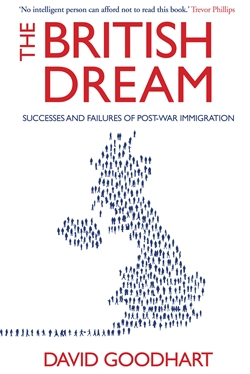
In The British Dream, David Goodhart tells the story of post-war immigration and charts a course for its future. Drawing on hundreds of interviews with people from all over the country and a wealth of statistical evidence, he paints a striking picture of how Britain has been transformed by immigration and examines the progress of its ethnic minorities – projected to be around 25 per cent of the population by the early 2020s. Britain today is a more open society for minorities than ever before, but it is also a more fragmented one. Goodhart argues that an overzealous multiculturalism has exacerbated this problem by reinforcing difference instead of promoting a common life. The multi-ethnic success of Team GB at the 2012 Olympics and a taste for chicken tikka masala are not, he suggests, sufficient to forge common bonds; Britain needs a political culture of integration. Goodhart concludes that if Britain is to avoid a narrowing of the public realm and sharply segregated cities, as in many parts of the US, its politicians and opinion leaders must do two things. Firstly, as advocated by the centre right, they need to bring immigration down to more moderate and sustainable levels. Secondly, as advocated by the centre left, they need to shape a progressive national story about openness and opportunity – one that captures how people of different traditions are coming together to make the British dream. Taken from Atlantic
Posted on April 24, 2014 by The Orwell Prize -

Award-winning journalist James Fergusson is among the few to have witnessed at first hand the devastating reality of life in the failed and desperate state of Somalia. This corner of the world has long been seen as the rotting and charred heart of Africa: a melting pot of crime, corruption, poverty, famine and civil war. And in recent years, whilst Somalia’s lucrative piracy industry has grabbed the headlines, a darker, much deeper threat has come of age: the Al Qaida-linked militants Al Shabaab, and the dawn of a new phase in the global war on terror. Yet, paradoxically, Somalia’s star is brightening, as forms of business, law enforcement and local politics begin to establish themselves, and members of the vast Somali diaspora return to their homeland. Fergusson takes us to the heart of the struggle, meeting everyone from politicians, pirates, extremists and mercenaries to aid workers, civilians and refugees. He gives a unique account of a country ravaged by war, considers what the future might hold for a generation who have grown up knowing little else and exposes the reality of life in this hard, often forgotten land. Taken from Random House
Posted on March 26, 2014 by The Orwell Prize -

Moscow 1945. As Stalin and his courtiers celebrate victory over Hitler, shots ring out. On a nearby bridge, a teenage boy and girl lie dead. But this is no ordinary tragedy and these are no ordinary teenagers, but the children of Russia’s most important leaders who attend the most exclusive school in Moscow. Is it murder? A suicide pact? Or a conspiracy against the state? Directed by Stalin himself, an investigation begins as children are arrested and forced to testify against their friends – and their parents. This terrifying witch-hunt soon unveils illicit love affairs and family secrets in a hidden world where the smallest mistakes will be punished with death. Taken from Random House
Posted on March 26, 2014 by The Orwell Prize -

Why do democracies keep lurching from success to failure? The current financial crisis is just the latest example of how things continue to go wrong, just when it looked like they were going right. In this wide-ranging, original, and compelling book, David Runciman tells the story of modern democracy through the history of moments of crisis, from the First World War to the economic crash of 2008. A global history with a special focus on the United States, The Confidence Trap examines how democracy survived threats ranging from the Great Depression to the Cuban missile crisis, and from Watergate to the collapse of Lehman Brothers. It also looks at the confusion and uncertainty created by unexpected victories, from the defeat of German autocracy in 1918 to the defeat of communism in 1989. Throughout, the book pays close attention to the politicians and thinkers who grappled with these crises: from Woodrow Wilson, Nehru, and Adenauer to Fukuyama and Obama. The Confidence Trap shows that democracies are good at recovering from emergencies but bad at avoiding them. The lesson democracies tend to learn from their mistakes is that they can survive them–and that no crisis is as bad as it seems. Breeding complacency rather than wisdom, crises lead to the dangerous belief that democracies can muddle through anything–a confidence trap that may lead to a crisis that is just too big to escape, if it hasn’t already. The most serious challenges confronting democracy today are debt, the war on terror, the rise of China, and climate change. If democracy is to survive them, it must figure out a way to break the confidence trap. Taken from Princeton University Press
Posted on March 26, 2014 by The Orwell Prize -

On 11 September 2001, in a café in London, Ahmed Errachidi watched as the twin towers collapsed. He was appalled by the loss of innocent life. But he couldn’t possibly have predicted how much of his own life he too would lose because of that day. In a series of terrible events, Ahmed was sold by the Pakistanis to the Americans in the diplomatic lounge at Islamabad airport and spent five and a half years in Guantanamo. There, he was beaten, tortured, humiliated, very nearly destroyed. But Ahmed did not give in. This very ordinary, Moroccan-born London chef became a leader of men. Known by the authorities as The General, he devised protests and resistance by any means possible. As a result, he spent most of his time in solitary confinement. But then, after all those years, Ahmed was freed, his innocence admitted. This is Ahmed’s story. It will make you rethink what it means to be in the wrong place at the wrong time. It will also make you look anew at courage, survival, justice and the War on Terror. Taken from Random House
Posted on March 26, 2014 by The Orwell Prize -
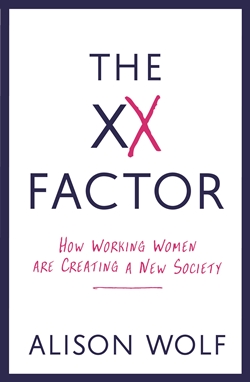
For most of history, being female defined the limits of a woman’s achievements. But now, women are successful careerists equal to men. In Norway, women legally must constitute a third of all boards; in America, women have gone from 3% of practising lawyers in 1970 to 40% today, and over half of all law students. These changes are revolutionary – but not universal: the ‘sisterhood’ of working women is deeply divided. Making enormous strides in the workplace are young, educated, full-time professionals who have put children on hold. But for a second group of women this is unattainable: instead, they work part-time, earn less, are concentrated in heavily feminised occupations like cleaning and gain income and self-worth from having children young. As these two groups move ever further apart, shared gender no longer automatically creates interests in common with other women. The XX Factor lifts the curtain on these social, cultural and economic schisms. Taken from Profile
Posted on March 26, 2014 by The Orwell Prize -

As political change sweeps the streets and squares, parliaments and presidential palaces of the Arab world, Shereen El Feki has been looking at upheaval a little closer to home – in the sexual lives of men and women in Egypt and across the region. The result is an informative, insightful and engaging account of a highly sensitive, and still largely secret, aspect of Arab society. Sex is entwined in religion and tradition, politics and economics, gender and generations, so it makes the perfect lens for examining the region’s complex social landscape. From pregnant virgins to desperate housewives, from fearless activists to religious firebrands, Sex and the Citadel takes a fresh look at the sexual history of the Arab region, and brings new voices to the debate over its future. This is no peep show or academic treatise. Sex and the Citadel is a highly personal, often humorous, account of one woman’s journey to better understand Arab society at its most intimate, and in the process, better understand her own origins. Rich with five years of groundbreaking research from Egypt to Saudi Arabia, Tunisia to Qatar, Sex and the Citadelgives us unique and timely insight into everyday lives in a part of the world that is changing in front of our very eyes. Taken from Random House
Posted on March 26, 2014 by The Orwell Prize -

Kith is a passionate examination of what it means to be a child, by Jay Griffiths, the award-winning author of Wild. While travelling the world in order to write her award-winning book Wild, Jay Griffiths became increasingly aware of the huge differences in how childhood is experienced in various cultures. One central riddle, in particular, captured her imagination: Why are so many children in Euro-American cultures unhappy — and why is it that children in many traditional cultures seem happier? In Kith, Jay Griffiths explores these questions and many more. Moving from communities in West Papua and the Arctic to the ostracised young people of contemporary Britain, she asks why we have enclosed our children in a consumerist cornucopia but denied them the freedoms of space, time and deep play. She uses history, philosophy, language and literature to illustrate children’s affinity for the natural world and the essential quest element of childhood. Kith is Jay Griffiths’ impassioned, illuminating analysis of a universal rite of passage. In its urgent defence of the rights and needs of every child, it is a journey into the heart of human experience. Taken from Penguin
Posted on March 26, 2014 by The Orwell Prize -

Philosopher, statesman, and founder of modern conservatism, Edmund Burke is both the greatest and most under-rated political thinker of the past three-hundred years. Born in Ireland in 1729, and greatly affected by its bigotry and extremes, his career constituted a lifelong struggle against the abuse of power. Amid the 18th century’s golden generation that included his companions Adam Smith, Samuel Johnson and Edward Gibbon, Burke’s controversial mixture of conservative and subversive theories made him first a marginal figure, and finally a revered theorist – a hero of the Romantics. He warned of the effects of British rule in Ireland, the loss of the American colonies, and most famously, he foresaw the disastrous consequences of revolution in France. This he predicted, would trigger extremism, terror and the atomisation of society – a profound analysis that continues to resonate today. In this absorbing new biography Conservative MP Jesse Norman gives us Burke anew, vividly depicting his dazzling intellect, imagination and empathy against the rich tapestry of 18th century Europe. Burke’s wisdom, Norman shows, applies well beyond the times of empire to the conventional democratic politics practised in Britain and America today. We cannot understand the defects of the modern world, or modern politics, without him. Taken from Harper Collins
Posted on March 26, 2014 by The Orwell Prize -

Both beautiful and profoundly menacing, the Kremlin has dominated Moscow for many centuries. Behind its great red walls and towers many of the most startling events in Russia’s history have been acted out. It is both a real place and an imaginative idea; a shorthand for a certain kind of secretive power, but also the heart of a specific Russian authenticity. Catherine Merridale’s exceptional new book revels in both the drama of the Kremlin and its sheer unexpectedness: an impregnable fortress which has repeatedly been devastated, a symbol of all that is Russian substantially created by Italians. The Kremlin is one of the very few buildings in the world which still keeps its original, late medieval function: as a palace, built to intimidate the ruler’s subjects and to frighten foreign emissaries. Red Fortress brilliantly conveys this sense of the Kremlin as a stage set, nearly as potent under Vladimir Putin as it was under earlier, far more baleful inhabitants. Taken from Penguin
Posted on March 20, 2013 by The Orwell Prize -
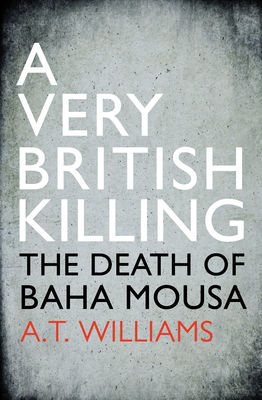
On 15 September 2003 Baha Mousa, a hotel receptionist, was killed by British Army troops in Iraq. He had been arrested the previous day in Basra and was taken to a military base for questioning. For forty-eight hours he and nine other innocent civilians had their heads encased in sandbags and their wrists bound by plastic handcuffs and had been kicked and punched with sustained cruelty.
A succession of guards and casual army visitors took pleasure in beating the Iraqis, humiliating them, forcing them into stress positions in temperatures up to 50 degrees Centigrade, and watching them suffer in the dirty concrete building where they were held. Other soldiers, officers, medics, the padre, did not take part in the violence but they saw what was happening and did nothing to stop it. Some knew it was wrong. Some weren’t sure. Some were too scared to intervene. But none said anything or enough until it was far too late and Baha Mousa had been beaten to death.
This book tells the inside story of these crimes and their aftermath. It examines the institutional brutality, the bureaucratic apathy, the flawed military police inquiry and the farcical court martial that attempted to hold people criminally responsible. Even though a full public inquiry reported its findings into the crimes in September 2011, its mandate restricted what it could say. The full story, told with the power of a true-crime expose or court-room drama, shows how this was not simply about a few bad men or ‘rotten apples’. It shines a light on all those involved in the crime and its investigation, from the lowest squaddie to the elite of the army and politicians in Cabinet. What it reveals is devastating.
Taken from Random House
Posted on March 20, 2013 by The Orwell Prize -

The world has watched, stunned, the bloodshed in Mexico. Forty thousand murdered since 2006; police chiefs shot within hours of taking office; mass graves comparable to those of civil wars; car bombs shattering storefronts; headless corpses heaped in town squares. And it is all because a few Americans are getting high. Or is it part of a worldwide shadow economy that threatens Mexico’s democracy? The United States throws Black Hawk helicopters, DEA assistance, and lots of money at the problem. But in secret, Washington is at a loss. Who are these mysterious figures who threaten Mexico’s democracy? What is El Narco?
El Narco is not a gang; it is a movement and an industry drawing in hundreds of thousands, from bullet-riddled barrios to marijuana-covered mountains. The conflict spawned by El Narco has given rise to paramilitary death squads battling from Guatemala to the Texas border (and sometimes beyond). In this “propulsive … high-octane” book (Publishers Weekly), Ioan Grillo draws the first definitive portrait of Mexico’s cartels and how they have radically transformed in the past decade. Taken from Bloomsbury
Posted on March 20, 2013 by The Orwell Prize -

One quiet day when her mother was away from home, Carmen Bugan’s father put on his best suit and drove into Bucharest to stage a one-man protest against Ceauşescu. He had been typing pamphlets on an illegal typewriter and burying it in the garden each morning under his daughter’s bedroom window. This is the story of what happened to Carmen and her family, isolated and under surveillance in their beloved village home. It is an intimate piece of our recent history, the testimony of an extraordinary childhood left abruptly behind. Above all, it is a luminous, compassionate, and unflinchingly honest book about the price of courage, the pain of exile, and the power of memory.
Posted on March 20, 2013 by The Orwell Prize -
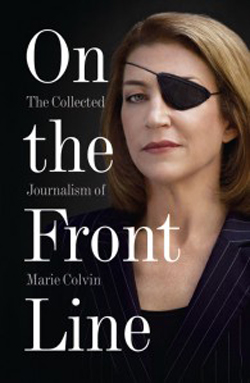
A fearless, passionate veteran reporter of conflicts from around the world, Sunday Times journalist Marie Colvin was killed in February 2012, covering the uprising in Syria from the besieged city of Homs. On the Front Line is a collection of her finest work, a portion of the proceeds from which will go to the Marie Colvin Memorial Fund. Marie Colvin held a profound belief in the pursuit of truth, and the courage and humanity of her work was deeply admired. On the Front Line includes her various interviews with Yasser Arafat and Colonel Gadaffi; reports from East Timor in 1999 where she shamed the UN into protecting its refugees; accounts of her terrifying escape from the Russian army in Chechnya; and reports from the strongholds of the Sri Lankan Tamil Tigers where she was hit by shrapnel, leaving her blind in one eye. Typically, however, her new eye-patch only reinforced Colvin’s sense of humour and selfless conviction. She returned quickly to the front line, reporting on 9/11, Afghanistan, Iraq, Gaza and, lately, the Arab Spring. Immediate and compelling, On the Front Line is a street-view of the historic events that have shaped the last 25 years, from an award-winning foreign correspondent and the outstanding journalist of her generation. Taken from HarperCollins
Posted on March 20, 2013 by The Orwell Prize -
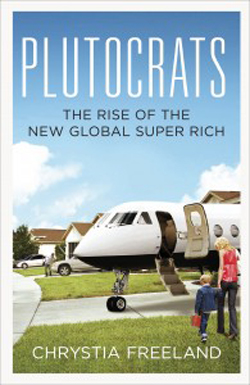
The rich really are different … There has always been some gap between rich and poor, but it has never been wider – and now the rich are getting wealthier at such breakneck speed that the middle classes are being squeezed out. While the wealthiest 10% of Americans, for example, receive half the nation’s income, the real money flows even higher up, in the top 0.1%. As a transglobal class of highly successful professionals, these self-made oligarchs often have more in common with one another than with their own countrymen. But how is this happening, and who are the people making it happen? Chrystia Freeland, acclaimed business journalist and Global Editor-at-Large of Reuters, has unprecedented access to the richest and most successful people on the planet, from Davos to Dubai, and dissects their lives with intelligence, empathy and objectivity. Pacily written and powerfully researched, Plutocrats could not provide a more timely insight into the current state of Capitalism and its most wealthy players. Taken from Penguin
Posted on March 20, 2013 by The Orwell Prize -

The culmination of more than a decade of research, The Spanish Holocaust seeks to reflect the intense horrors visited upon Spain during its ferocious civil war, the consequences of which still reverberate bitterly today. The brutal, murderous persecution of Spaniards between 1936 and 1945 is a truth that should have been told long ago. Paul Preston here offers the first comprehensive picture of what he terms “the Spanish Holocaust”: mass extra-judicial murder of some 200,000 victims, cursory military trials, torture, the systematic abuse of women and children, sweeping imprisonment, the horrors of exile. Those culpable for crimes committed on both sides of the Civil War are named; their victims identified. The Spanish Holocaust illuminates one of the darkest, least-known eras of modern European history.
Posted on March 20, 2013 by The Orwell Prize -

WARNING: THE PHARMACEUTICAL INDUSTRY HAS SERIOUS SIDE EFFECTS. These include: flawed clinical trials followed by the suppression of unfavourable results, poor regulation, diseases invented purely for profit, swollen marketing budgets, doctors and academics in the pay of pill manufacturers. If you find this hard to swallow, please seek the urgent medical advise of Dr Ben Goldacre as he dissects the drug industry, offering a simple and effective remedy for the sick business of Big Pharma.
Posted on March 20, 2013 by The Orwell Prize -

At fourteen, Richard Holloway left his home in the Vale of Leven, north of Glasgow, and travelled hundreds of miles to be educated and trained for the priesthood by a religious order in an English monastery. By twenty-five he had been ordained and was working in the slums of Glasgow. Throughout the following forty years, Richard touched the lives of many people in the Church and in the wider community. But behind his confident public face lay a restless, unquiet heart and a constantly searching mind. Why is the Church, which claims to be the instrument of God’s love, so prone to cruelty and condemnation? And how can a man live with the tension between public faith and private doubt? In his long-awaited memoir, Richard seeks to answer these questions and to explain how, after many crises of faith, he finally and painfully left the Church. It is a wise, poetic and fiercely honest book. Taken from Canongate

















